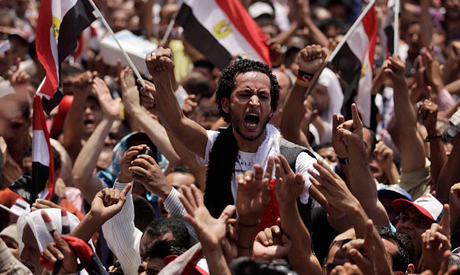Why Is Egypt Scared Of The Jan 25 Revolution Anniversary?
Egypt's revolution

NEW DELHI: As treacherous as it may sound but as the 5th anniversary of the January 25 uprising approaches, Egypt is ready for what could be its toughest crackdown in history. The fear is so palpable that when the two Egyptian activists Ali al-Khouly and Mohamed Ali just sat down for a cup of coffee in plainclothes, they were arrested by the police who wanted to know their plans for January 25.
The likelihood of another protest, in spite of social media networking still prevalent in Egypt, is very low. There are thousands of political activists arrested without any reason, hundreds of political journalists behind the bars. With numerous members of Muslim Brotherhood arrested and killed, even this grassroots’ organization has limited reach. On top of that, the present youth of Egypt, is disillusioned with how the January 25 revolutions actually took place with no concrete result following up.
In spite of ending the 30-year old rule of Mubarak’s regime, Egypt is now controlled, more strictly and vehemently by the army state under the rule of Sisi. But the paranoia within the government can be felt. In the recent days, the police has been conducting mass searches of flats in down-town Cairo area as well as near the Tahrir Square, which was the epicenter of the January 25 uprisings. A publishing house and four cultural centers were raided and shut down. Various activists promoting protests have also bumped up against Egypt’s so-called anti-protest law, which requires citizens to obtain a state permit before holding a public gathering of 10 or more people.
The regime of Sisi has arrested 47 administrators of Facebook pages which have been critical of the government, sending a clear message to the country – Monday, January 25, which marks the 5th anniversary of the Arab Spring in Egypt, is just another day. Sisi recently gave a televised address asking the citizens why they wanted to ruin the country with another revolution.
Well, it was just not the self-immolation of Mohammed Bouzazi in Tunisia that has sparked the outrage in Egypt, galvanizing into a major force. It was the high demographic youth bulge, the precarious economic conditions, the low standard of living and the high rate of unemployment. All these curses continue to haunt the Egyptians even today, with the Sisi government unable to tackle these burgeoning issues, thereby corroding its political legitimacy.
The economic morass has been coupled with the rise of Islamic State-inspired insurgency that had been previously confined to the Sinai Peninsula but now has grown to include sporadic attacks in Cairo— definitely a tremendous blow to Mr. Sisi’s image as a security-minded military man.
Meanwhile, the Ministry of Religious Endowments has been carrying out Friday sermons, explicitly warning against any kind of gathering this January 25th. One sermon, titled as “The Blessing of Safety and Security” directly stated how those who strike against the government are committing a sin in the eyes of the God.
Currently, there have been no formal calls to mark the anniversary with mass demonstrations by any group in Egypt, and most Egyptians expect the anniversary to pass quietly. But individual members of the outlawed Muslim Brotherhood, mostly in exile, have urged their supporters to hit the streets. Small Facebook groups run by leftist activists have also appeared in recent months calling for another uprising on Jan. 25.
Social media in Egypt has buzzed with praise for the revolution that toppled Hosni Mubarak in 2011, with the phrase “I participated in the January revolution” topping social media trends over the past two days. According to the activists, the social media campaign seeks to counter official information that has demonized the revolution. “The regime succeeded in controlling the media to give the idea that the revolution was a conspiracy,” reads the statement.
But Al-Sayed al-Badawi, chairman of the liberal Al-Wafd party, said fears over Jan. 25 are exaggerated. “This is not the first time we hear concerns about the revolution’s anniversary and then nothing happens,” he said. “Security forces are blowing the whole issue out of proportion, and I am positive nothing will happen since Egyptian people will not be deceived into taking part in protests organized by factions that plot against the state.”
Ali Maher, a member of the April 6 Youth Movement politburo, accused the state of fabricating conspiracies in order to target revolutionaries. “How can this happen while the current regime is only in power thanks to the Jan. 25 revolution?”
Nevertheless, the state is literally exaggerating its fear of another uprising this January 25th, when the entire machinery of causing such kind of upheaval is not present as of now.
(The writer is a PhD scholar in Jawaharlal Nehru University, New Delhi)



